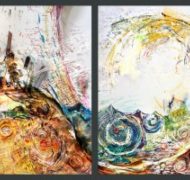Vocation by Death: Film Review of Departures
Blog / Produced by The High Calling
This past Easter, I found myself in a conversation with some friends about death. More specifically, about how our culture views and deals with the grief of losing a loved one. One person suggested that most people are in denial about it: “we put the aged in homes away from ‘real life’”; “we protect children from funerals.”
We also purchase anything that promises to keep us young and beautiful. Even talk of vocation sometimes leaves out the meaning of our work beyond death. It can seem that we just work hard serving family, society, church and self in the here and now.
I think there might be something wrong with this view of life and death. And maybe we should talk about it.
Departures
I recently finished reading N.T. Wright’s book on heaven and resurrection called Surprised by Hope. Wright argues that we live in a culture that assumes a lot about life after death, and this assumption guides our view of vocation. We often talk and act as though we were made for a different world, and we are. But, Wright points out, that different world is not one absent of time, space, and matter. It is the joining together of heaven and earth. It is “on earth as it is in heaven.”
While reflecting on my Easter conversation and Wright’s book, I viewed the Japanese film, Departures. Departures won the Oscar for Best Foreign Language Film in 2009 and it beautifully captures this tension between vocation and our ultimate confrontation with death.
The main character, Daigo, is a talented cellist and young newlywed who is planning to travel the world with his wife, Mika, as he plays in a renowned orchestra. However, the owner of the orchestra decides that it is no longer financially viable and dissolves it. This leaves Daigo out of work and unsure of where his vocation is headed. He suggests to Mika that he quit the cello and that they move back to his hometown where his mother has left him a house. Mika agrees and Daigo begins to look for a job there.
His curiosity is piqued by an ad for an agency specializing in departures; a travel agency, he assumes.
His new boss calls it fate that Daigo has shown up for the interview, and before Daigo even really knows what this company does, he has the job and a sizeable advance. Doing what? Casketing. Preparing bodies to be placed in a casket and eventually sent to the crematorium.
Japanese culture has many rituals and beliefs attached to death. Touching or working with a dead body, for example, is considered bad luck. Culturally dirty, it leaves the person – in this case, Daigo – unclean. Daigo is ashamed and has no choice but to hide his work from his wife and friends, deceptively telling them that he assists with various “ceremonies.”
Arrivals
As Daigo learns the techniques of the trade, however, and the emotional intelligence required to perform the work, he begins to excel. He actually starts to enjoy his work, recognizing the deep meaning it has for those grieving. Through it he begins to see the rich dignity of people’s lives, and this new insight overflows into his personal life. He draws closer to his wife and plays his childhood cello once again – both of which become symbols of life for him. It also begins to shape his character. For instance, when he is confronted with choices, he is no longer indecisive, but has the faith and commitment to be true to his new found sense of vocation.
I don’t want to spoil the complexity of this film, but Departures is an excellent catalyst for reflecting on the meaning of vocation in light of the inevitable end that becomes of all human vocations. Death confronts us with important and ultimate questions: Does what I do matter, or last? What is the reason to pursue excellence in my work?
Wright concludes that it is our vision of what is beyond death that shapes our sense of vocation in life. In other words, it is in relation to our ultimate hope beyond death that our waking and working life is oriented.
Daigo’s story is helpful in understanding the importance of conversations – like the one I had at Easter – about death, grieving, and meaning. While Departures doesn’t neatly answer our questions, like all good art it tells a beautiful and compelling story. And this particular story illuminates what can happen when we question our calling and the ultimate meaning of our work and lives.
How does death affect your view of work? How does life after death affect your view of work?
"Rise; Fall" photo by Harold Sikkema. Used with permission. Post written by Greg Veltman.





